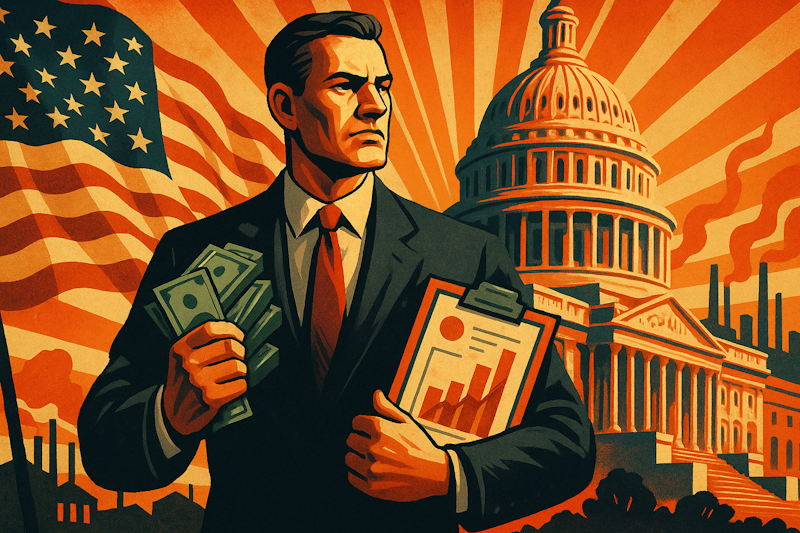There’s a new religion sweeping the halls of Washington.
Its evangelists call it Modern Monetary Theory, or MMT for short. But Magic Money Thinking seems more on point. Because the only constraint it places on spending depends entirely on the willingness of politicians to exercise discipline should inflation rear its ugly head, assuming they see it coming in the first place.
I know…laughable.
In any case, rather than focusing on the conditions that create prosperity in the first place, the pressure is growing to conjure it out of thin air. And as the spiraling cost of order drives the entire political spectrum to demand increasingly more money to maintain it, the flawed logic of MMT provides the badly needed intellectual cover for politicians of all stripes to throw open the flood gates and fund their goals.
And that takes us in only one direction – inflation.
Not the run-of-the-mill kind. Not the self-correcting kind. But the panic, buy-what-you-can-and-dump-your-dollars kind.
The inflation we’re seeing today is just a taste of what’s coming. As the consequences of the meddler’s mandates and malinvestment pile up, money for nothing will provide a last resort to prop up even more costly promises on their unwitting constituents.
But those promises are an illusion…
Debt as Discipline
The central claim of MMT is that a government can borrow whatever it wants because it only owes money to itself.
This is technically true.
I would even take it one step further and state that money doesn’t need to be backed by anything at all. It doesn’t need debt, gold, silver or anything else for that matter from which it derives its value.
People value currency with certain attributes. Bitcoin proves that point. And one of those attributes needs to impose discipline on how the money supply grows.
So, theoretically, a government can fund itself without the burden of debt. It can simply issue currency, skip the whole national debt part, and still provide services.
This would be pure fiat currency.
But the flaw in that pure fiat logic, which also holds for MMT, would be to trust that Congress or Central Bankers can maintain that discipline.
Gold or silver backing imposes a hard form of discipline. Market participants can redeem their currency notes for the underlying precious metal when the money supply grows too quickly.
A debt-backed currency can also provide that discipline. The Federal Reserve, and the market, can increase the cost of debt to nip money expansion in the bud.
But the market isn’t really involved anymore because the Fed monetizes so much of the debt issued by the Treasury, (with a short stop on primary dealer balance sheets). Plus, the Fed now has so many mandates – inflation, employment, growth, social inclusion – that monetary discipline gets drowned out by competing priorities.
Where MMT falls short is that it lacks a mechanism for discipline that we can trust.
And that lack of discipline can be exploited to create the illusion of prosperity by giving people what they want – money for nothing.
A Positive Feed-Back Loop of the Wrong Kind
The ultimate form of money for nothing is direct payments to people from the U.S. treasury.
We’ve had a minor form of this for decades through welfare payments. Federal Pandemic Unemployment Compensation took it a step further and now we have Child Tax Credit Payments hitting bank accounts directly each month, whether you’re working or not.
The perverse incentives created by these programs keep people out of the work force and only compound the supply chain logistical problems plaguing the U.S. right now.
And as the knock-on effects of the meddler’s malicious efforts stirs more unrest among the subjects, the only resort for politicians will be to do more of the same.
You already see it in all the talk of a Central Bank Digital Currency (CBDC). This will enable the Fed itself to issue currency directly to people. And Biden’s nomination to head the Office of the Comptroller of the Currency, Saule Omarova, wants to eliminate checking deposits with banks entirely, forcing all us into checking accounts with the Federal Reserve.
From there, it’s a very short step to productivity crushing Universal Basic Income (UBI) payments.
At first, some people choose not to work. Productivity falls and prices rise. This begs for bigger payments – wash, rinse repeat.
But you’re not defenseless against this inflationary positive feed-back loop. Because you not only see where this leads, but you have the power to do something about it.
And that power lies in exchanging those U.S. dollars for something whose value you can trust.
Betting Against a System that Can’t Work
Gold and silver can’t be printed on demand, so you can trust that their value in dollars will rise in this scenario. This is why I’ve recommended that you own the Sprott Physical Silver Trust (NYSE: PSLV) and Pax Gold asset-backed tokens (PAXG on the Gemini crypto exchange).
You can also trust cryptocurrencies like Bitcoin and Zcash to benefit from inflation as well – just don’t be surprised when the U.S. government props up barriers to their use. These are long-term plays.
But you can also trust businesses to act in their self-interest.
Companies are free to accept and hold whatever form of payment they want. So long as they add value through delivering Economic Profits, you can stay ahead of the inflationary curve by owning stocks in those companies generating high returns on capital.
And one company bridging the divide between dollars and crypto for businesses is Silvergate Bank (NYSE: SI).
It’s a B2B bank based in La Jolla, California providing banking services to digital currency and fintech companies. The company grew revenue 84% over the last twelve months. And should it continue to grow revenue at only half that rate, the stock still looks like a bargain, even at $141 per share.
So, consider adding Silvergate to your portfolio of value creating disruptors, and make yet one more bet against the system in the process.



